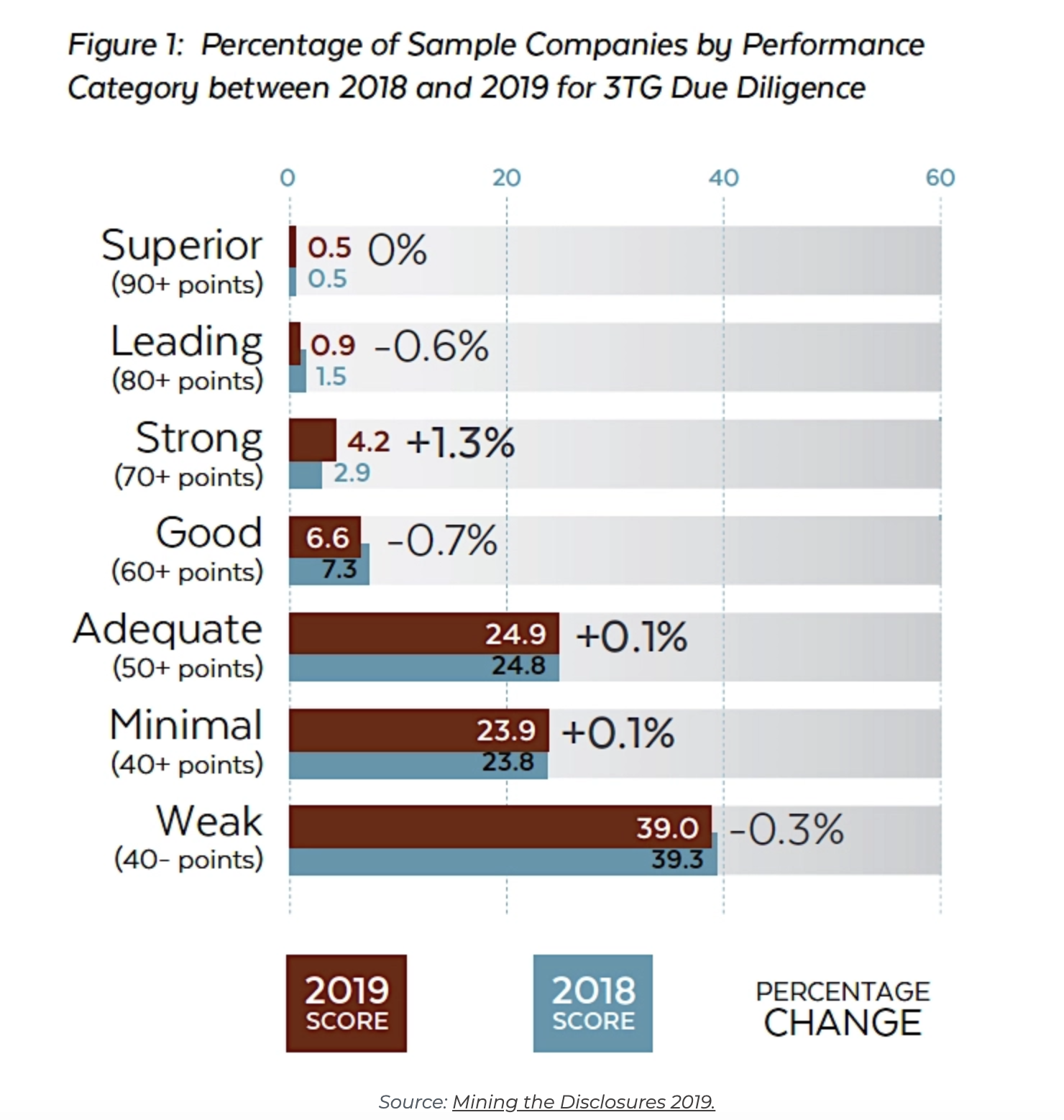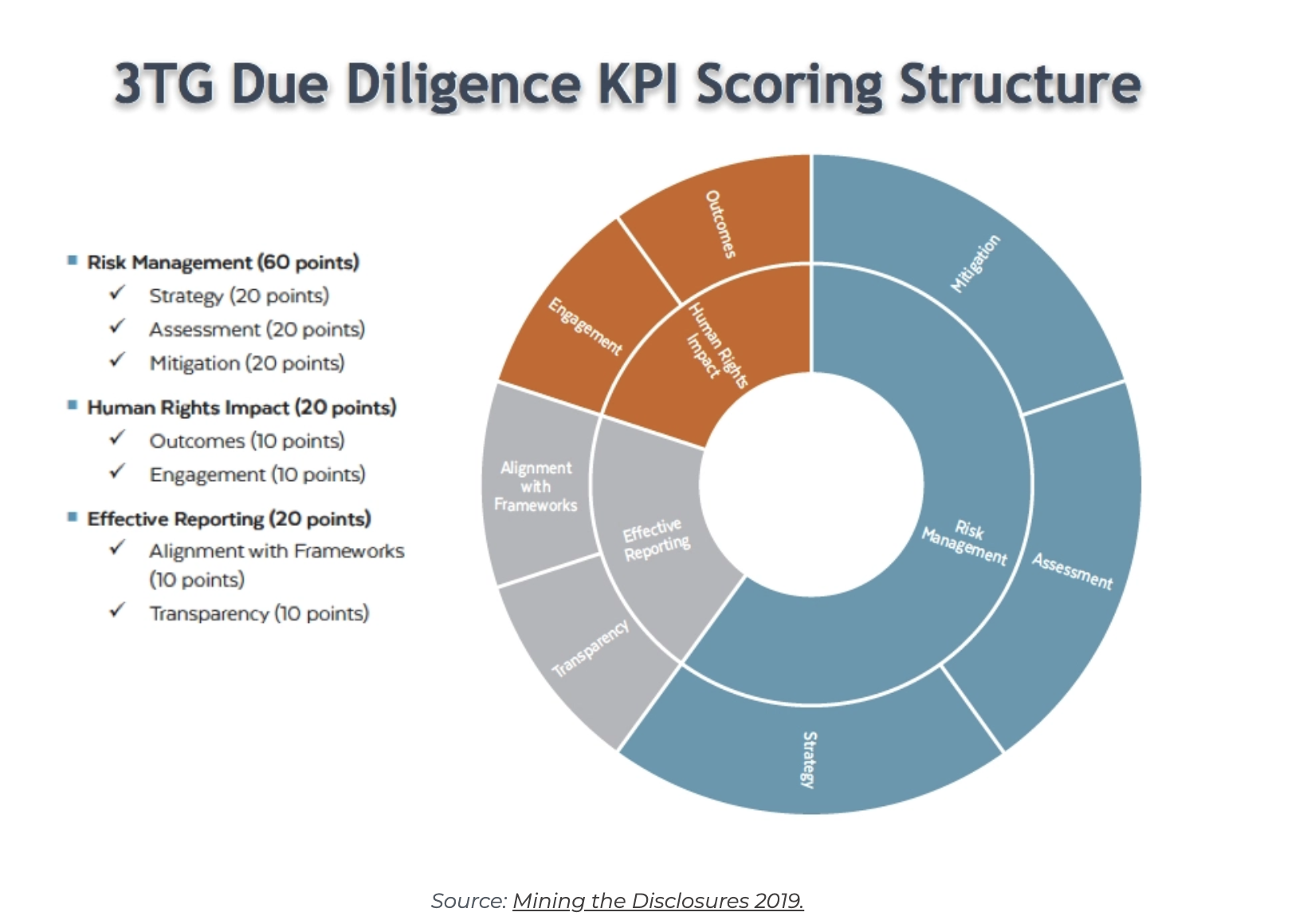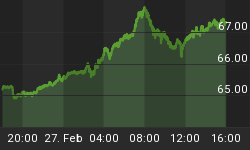Nine years after the implementation of a law requiring publicly traded companies to ensure their raw materials don’t come from mines that use child labour or fund warlords or corrupt soldiers, companies’ efforts to comply continue to fall short.
Dodd-Frank legislation requires companies operating in conflict areas such as the Democratic Republic of Congo (DRC) to conduct due diligence to establish their commodities are conflict-free. The minerals involved are tin, tantalum, tungsten and gold (3TG) .
But US President Trump’s threat in 2017 to suspend Section 1502 and the SEC’s subsequent decision of not enforcing the law, has encouraged companies to neglect 3TG supply chain due diligence.
According to the annual report by the Responsible Sourcing Network (RSN), now in its sixth edition, companies’ attempts at conducting due diligence and reporting their practices have decreased.
The study, which analyzed 215 companies’ actions around 3TG, said firms scored 39.8 points in the last 12 months, down from 40.3 points they achieved in the same period the previous year.

(Click to enlarge)
The rating system is based on 24 key performance indicators (KPIs) divided across three themes, analyzing disclosures to the US Securities and Exchange Commission’s (SEC) conflict minerals policies, and any other conflict-minerals-related documents or descriptions of activities on company websites.
Each KPI is weighted according to its significance and in relation to the number of sub-indicators for each theme. For companies to earn points for a KPI score, the corresponding information must be publicly available.
“[This year’s scores] regrettably show the lack of efforts of a large number of companies, highlighted by the decline or stagnation of 59.8% of the sample, and, even more regrettably, 63% of the sample scores at mediocre levels (categories of minimal and weak),” RSN, a body that aims at ending human rights abuses and forced labour related to the extraction of raw materials, notes.
“The fact that a large majority of the companies disregard their corporate responsibility on conflict minerals and cobalt is the result of the U.S. administration’s policies, but also reflects internal business decisions,” Raphaël Deberdt, author of the Mining the Disclosures 2019 report, says.

(Click to enlarge)
The study, which also ranks the efforts of 27 companies to address child labour and other human rights abuses in their cobalt supply chains, as established by the Dodd Frank Act Section 1502, shows that the technology sector remains a leader on the topic.
Companies achieving a score of 70 or higher have shown their ability to innovate beyond simple compliance, accomplishing an integrated and robust response to conflict minerals risks, the report says.
The three bottom-performing industries were, for a second year in a row, integrated oil & gas, steel, and business services. However, building materials gained an average of eight points, moving it to 17th place up from 23rd.

(Click to enlarge)
The six leading companies were mostly in the IT sector — Intel, Microsoft, Apple, HP, Dell Technologies, and Ford. They all have excelled at adopting proactive, due diligence-based strategies and leading the way in terms of transparency. Related: Millions Missing After Marijuana Ponzi Scheme Implodes
It doesn’t mean, however, that supply chains are free of conflict minerals, particularly of those coming from the resource-rich, but impoverished DRC.
Pressure builds
Allegations of abusive mining practices in Congo came to light in 2015, largely focusing on informal, or artisanal, small scale mining (ASM). The country’s cobalt — a key component in the batteries used in electric vehicles and smart phones— is said to be mostly mined by hand, in often dangerous conditions and sometimes by minors.
According to Amnesty International, children as young as seven have been found scavenging for rocks containing cobalt in the DRC. The group also claims to have evidence that the cobalt those miners dig has been entering the supply chains of some of the world’s biggest brands.
Traditionally, artisanal miners have sold their ore to local cooperatives, which then sell it to local merchants and traders. They, in turn, sell to international traders or operating mines with established transport links and that cobalt ends up being exported mostly to China.

(Click to enlarge)
Those and other allegations have put pressure on companies and on traders. The London Metal Exchange (LME), the world’s biggest market for industrial metals, has plans to ban metal tainted by human rights abuses. The initiative to ensure responsible sourcing originally had 2022 as the deadline, but LME will now wait until 2025.
The European Union in May 2017 passed a regulation to stop mine workers being abused and conflict minerals being exported to the EU. The requirement to ensure mineral imports are responsibly sourced will become effective on Jan. 1, 2021.
By Mining.com
More Top Reads From Safehaven.com
















